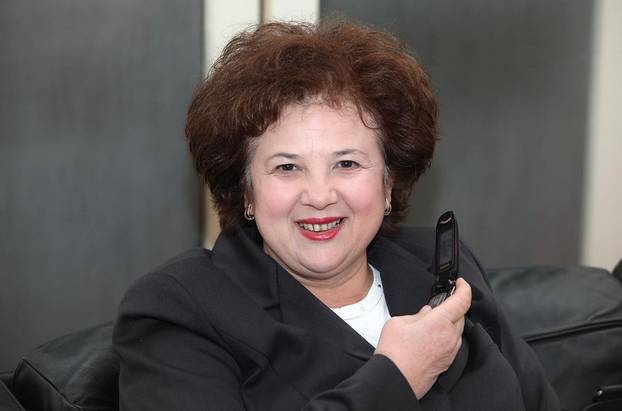Six steps to getting started with the to-do list

This text was published first in the New York Times.
The pomodor method. Powerposes. Planning calendars.
Denise Daskal has tried everything in the pursuit of the right strategy to improve its executive functions, that is, the mental skills used to manage time and perform tasks.
She has spent many Hours at Tiktok, read books and attended courses to become better organized and more focused both at work and in private life. But even though the long list of strategies can be of some help, it has also felt exhausting, she says.
« My psyche breaks down a bit when it happens too much at once, » says 63-year-old Denise Daskkal, who lives in Dearborn, Michigan, and who a few years ago was diagnosed with ADHD.
Conditions such as ADHD, autism, obsessive -compulsive disorder and depression can make it difficult to make the executive function of the brain. But it is also common for it to happen during the period in life when women enter and out of menopause – or over the years as a toddler parent, after a bad night’s sleep. Even a missed meal can impair a person’s ability to focus and complete tasks.
If you are planning to do something, the executive features will help you do it at the right time
But what is really Executive features?
– Executive functions are life management skills that help people « convert intentions into actions, says Ari Tuckman, a psychologist in West Chester, Pennsylvania, and author of » The ADHD Productivity Manual. «
In other words, if you plan to do something, the executive features will help you do it at the right time and in the right place because it will benefit you, either now or in the future, he adds. These skills are important to be able to plan, solve problems, manage time, make decisions and initiate tasks, and to control emotions and focus.
Amy Dorn, 44, is a three -child mother In Evergreen, Colorado. Her ADHD makes it difficult for her to stay calm as her brain gets overstimulated when it happens too many things at the same time. It doesn’t take long before she gets exhausted.
– Sometimes I can even scream straight out as high as I can, she says.
There are no quick solutions, but the awareness that her brain is different helps her calm down faster, take a deep breath and apologize.
« The children call me the person who apologizes, » she says.
Her behavior, to go From 0 to 100, may never disappear, so her family has found ways to prevent the overstimulation from occurring at all. Her husband has changed her working hours and started coming home earlier to make sure they are two who can drive the children to different activities. And they have limited children’s sports to one leisure activity per season.
There are plenty of techniques that can help improve the executive ability, for example the pomodor method that Denise Daskal tested and which is based on focusing for 25 minutes followed by a short break.
But before trying one of these strategies, it may be good to start with a short self -analysis, according to the experts.
She was so paralyzed by the idea of cleaning the garage that she went out and adopted a dog instead
1. Determine which aspects of executive function are most difficult for you
Tamara Rosier, founder of the ADHD Center of West Michigan and author of « You, Me, and Our Adhd Family », believes that the most common problem for her clients is difficult to start a task.
-The fact that the do list can feel overwhelming, which can lead to frustration, anxiety and avoidance, she says.
– An example is when a client planned to finally clean out his garage. She was so paralyzed by the idea that she went out and adopted a dog instead. Training a puppy seemed easier than being confronted with the thousands of small decisions required to organize at home.
2. Think about possible solutions to your problem
To start a task, ask yourself: « What makes this difficult to grab? »
– It can be about perfectionism, fear or unclear steps, says Tamara Rosier. Once you get a better idea of what it is that slows you, try to deal with it. If you are overwhelmed by emotions and unsure of what steps to take, write down what it is that feels overwhelming. Then ask yourself: « Do I overcome this task? » Challenge yourself to think out the easiest way to do it, says Tamara Rosier.
Another strategy, she adds, is to use « Body Double », which means working with someone else – either digitally or in the same place – to get up to speed. You can also combine your task with something nice as music or a pod to make it feel more fun.
3. Try to solve the problem outside your own head
To « externalize » your thought process – by discussing your problem with a friend, writing it down or physically manipulating the things you work with – can be of greater help than trying to keep everything in your head, says Ari Tuckman.
For example, Amy Dorn often forgets things that seem boring or everyday. She now wears a recording device on the wrist and reads her to-do list aloud, and then playing the latter in the day.
4. Set up reasonable expectations of yourself and others
Personal strategies work worse if your surroundings are not adapted for people with executive function deficiencies. An example may be if your job requires you to complete a complex task on your computer while continuing to receive chat messages – which may or may not require an answer.
Denise Daskala decided to go from owning a salon and a spa, which meant managing a facility with staff, to focusing on his dream of starting a new nail polish mark. This time, she says, she is aware of how much responsibility she takes on and what she needs to take help with. It helps her get time for sleep and exercise.
– I limit both how much I try to do in one day and how much time I spend on it, she says. Her mantra: « One step at a time, one thing at a time. »
It is also important to set expectations of the people you interact with, says Ari Tuckman.
– Say you are always late when you meet friends. You can work on coming earlier but also be honest and say: « Don’t go from home until I text you, » he suggests.
6. Don’t judge yourself too hard
If you have problems with executive function, it may be easy to blame yourself – especially if other people constantly seem to think you are insufficient.
Remind yourself that you are not inadequate or irresponsible, says Ari Tuckman. It is rather that you find it difficult to both fulfill what you intend to do and to juggle it with all other requirements in life, he adds.
This way of thinking can be « extremely affirmative, » he says, especially when someone has fought hard – sometimes even harder than others – but doesn’t have much to show off.
– If you are someone who struggles with executive functions, it is not certain that critical people with very high expectations are the people who should have the lead role in your life, says Ari Tuckman.
– It’s not just you who fits them badly – they fit badly for you.
This text was published first in the New York Times. © 2025 The New York Times Company








